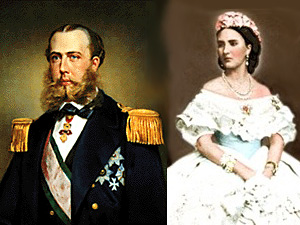Also, again, as far as the colonization, from a European standpoint, of the USA...........Spain controlled, at one point...........more than half of the now contiguous USA..........Pensacola, Fl, St. Augustine............................Fl..............were Spanish ports.........New Orleans......LA was a city from France.............the USA............Pres. Tom Jefferson...........bought the entire mid west from France........via the LA purchase................of course the Indians there must have thought the Americans were crazy................just who sold it to France in the 1st place???????
Mexico's Lasting European Influence
 |
| Born in Austria, Maximilian and Carlota were emperor and empress of Mexico from 1864 to 1867. Maximilian was executed in late 1867. |
In 1861, Mexico was bankrupt, owing staggering sums to Britain, Spain, France, and the U.S. Years earlier, the U.S. had offered to assume Mexico's debt in exchange for a mortgage on part of its territory. Mexico flatly rejected the offer, having already lost half its territory to the U.S. What kept the European powers from direct intervention in Mexico was the U.S. and its Monroe Doctrine of 1823, which warned Europe to stay away from interfering in this hemisphere.
But in the summer of 1861 the Civil War broke out. In October of that same year, France, Spain, and England convened to sign the Covenant of London, in which those nations agreed to send troops to Mexico in sufficient numbers to secure payments. They solemnly added that this use of force was not for territorial gain or interference in Mexico.
Spain and England sent the first bill-collecting expedition and met no resistance at Vera Cruz, but was unable to collect, though an agreement was reached.
Meanwhile, France had landed a sizable force in Mexico, and the European intervention became exclusively French.
On May 5, 1862, the French attacked Puebla, and the Mexican army, under Gen. Ignacio Zaragoza, defeated the militarily superior French forces. This victory gave Mexico an electric current of patriotism and inspiration. It gave Mexico a soul of her own and national unity. This is why Cinco de Mayo is almost as important as Sept. 16, Mexican Independence Day.
A mexican emperor
Meanwhile, Robert E. Lee was winning battles for the South. Had France won at Puebla, it would have joined forces with the South and easily convinced England to help free the Southern ports from the Union blockade. Louisiana had at one time been French. France and England wanted to paralyze U.S. expansion into Latin America. Napoleon III dreamed of building stronger ties between France and Mexico, because both were Latin. The victory at Puebla protected not only the integrity of Mexico but also that of the U.S.
A year later, the French won several victories, paving the way for Napoleon III to send Maximilian, Archduke of Austria, and his wife, Carlota, to set up a monarchy in Mexico. But the Mexican resistance continued, and Washington continued to recognize the Benito Juarez government as the only legitimate one. At times, the Juarez government was situated in El Paso (now named Ciudad Juarez), and at times the Juarez government did have to go into temporary exile on this side of the Rio Grande.
Maximilian and Carlota set up their court, wrote a book on court etiquette, and reintroduced Mexico City to the royal grandeur it had known earlier through Spain. There were many upper-class Mexicans who supported the monarchy.
The end of the empire
In 1865, the U.S. Civil War ended, and Maximilian is supposed to have exclaimed, "This is the end of the empire!"
By 1866 the armed resistance against the French occupation was growing and the victorious U.S. Army clamored for war against France. It had already been to Mexico as part of the U.S. invasion in 1847. For Mexico, the possibility of American involvement was more frightening than the French presence. At U.S. urging, the French, also facing problems in Europe, departed.
Thus the United States repaid Mexico for its resistance to the French, which prevented the French from becoming allies of the Confederates and indefinitely prolonging or changing the course of the Civil War.
In 1867 Maximilian would not abdicate his throne, declaring he was 100 percent Mexican, heart and soul. Besides, Napoleon III had promised to stand by him. Carlota had already returned to France to hold Napoleon to his word. Napoleon reneged.
Maximilian remained in Mexico and courageously met his execution on June 19, 1867. Carlota became despondent and eventually insane. She died in Belgium in 1922. Mexico's second war of independence came to an end with a cost of 300,000 casualties.
What did France leave in Mexico?
No comments:
Post a Comment